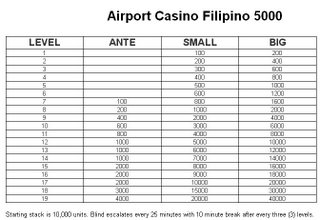Looking forward to my next entry on this blog, I fully expected to be writing about my experiences hosting/co-directing the first monthly ACF5K tourney yesterday. My fingers were primed to tap out words about key hands, astonishing performances, friends playing at the top of their game, geniuses, donks, afterparties, etc.
There were plenty of those yesterday.
But I can't write about them.
I gotta write about a thing I hoped I'd never have to seriously address in local poker.
Cheating.
1st and 2nd places yesterday were taken by a couple of guys that demonstrated that they'd worked out a rudimentary collusive strategy going into the game. The two that monied the deepest were part of a larger group who clearly had pieces of each other (evidenced by their final-table railbird buddies proclaiming in 110 decibel-level voices that their "chickens" were still in the game).
Let me first get something out of the way:
Now there's nothing wrong with trading pieces in a tourney...I do it all the time. This is where you and a few pals commit a percentage of any potential win you have to a communal pool. I'm a chickenshit gambler and I'll take any opportunity to hedge any day.
We tend to trade pieces with friends. Because it's psychologically natural to avoid tournament-ending confrontations with friends, you'll see a lot of implicit forms of collusion such as avoidance and soft-plays. The poker world will never be rid of this, so let's resign ourselves to it.
Having said this, honest players will work to win as many chips as they can, even if they own a stake in each other. Here's an example: two guys at the final table, let's call them Honest Marco and Upstanding George, owned 10% of each other. I did, however see them play
several huge, potentially tournament ending pots against each other with abandon and a clear desire to end the other guy's night. This despite the fact that the deeper
both got, the greater the economic benefit.
Enough with the honesty I saw, let's talk about the dishonesty:
Several people whose opinions, awareness, knowledge and eyesight I respect reported to me that two folks were engaging in blatant soft-play in the early and mid levels of the tourney. This is while they were seated side-by-side at a table. I won't go into the gory details, but suffice to say that a dealer's attention was drawn to it. The dealer did not inform any of the floors, TD Emi Mungcal, or myself.
Soft-play's one thing. Then I heard of some signaling going on. Rudimentary things like elbow-nudges and later, a clear signal at the final table (which caused TD Emi to pull the perpetrator aside and warn him of ejection should it continue). This sealed the deal for me. We were 4-handed at the final table at this point, so I decided that this tournament should finish without scandal. It did. It ended rather dryly, with a non-climactic awarding of final prizes and a rapid exit from the building by the (now richer) crew.
It was a dirty win. One that tainted an event I truly enjoyed, and one that was put on with the best of intentions.
To me, signaling in tourneys is probably the most egregious thing a player can do to inflate whatever edge he or she may have. If a teammate knows or is "told"
not to call or raise a bet one makes, he or she is now relying on information no other player has. The edge the team develops here is effectively put on steroids.
Signaling is also incredibly tough to spot or prove, because we're not privy to the codes team coaches develop. But most of us have a spidey sense when it comes to this kind of stuff, especially when perpetrated by donks who didn't exactly graduate with Post Doctoral degrees in scamming. So I'll risk slander charges and state that these guys did signal holdings and intentions in a malicious manner during the final table and where possible, earlier in the tournament.
Another nasty little activity is the good-old chip dump. "I'm short, you're big, we're on the same team, i'll donk off my stack to you." Or, "Im big, you're short, there's three of us left, you're about even with the guy we wanna knock out, so I'll double you".
Here's a situation from last night.
Final three
Team Player 1 huge stack
Poor guy just hangin on
Team Player 2 even with with non-team member
Team player 2 moves in for about 60K in chips, Team Player 1 calls with big stack, third guy folds.
If Team Players make 1st and 2nd, they make 200K total.
If they come in 1st and 3rd they make 20K or so less.
Team Player 2 shows T6o or some such.
Team player 1 shows 64o
T6o holds up, double up. Seals the deal for player number three, who busts about 3 hands after.
I understand that 64o can be a calling hand with a huuuuge stack and an opportunity to bust a shortstack. But in this case, we have a history of collusion between these two.
Again, tough to prove, but the evidence mounts.
Where the hell is this essay going? Oh yeah. These guys can no longer play in my tournaments. Period. Protecting everybody else's money is of paramount importance to me.
I'm also instituting a set of guidelines for spotting and dealing with collusion, and will work with the ACF guys and anybody else from PAGCOR who wishes to get involved.
I will never sit a ring game with these guys.
I hope I never see them in a tourney in which I've paid my hard-earned money for a shot at the pool.
Mau, Louie, Ron, I hope your 200K lasts a long, long time.




